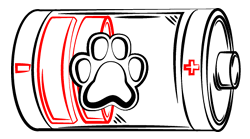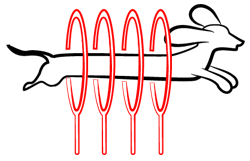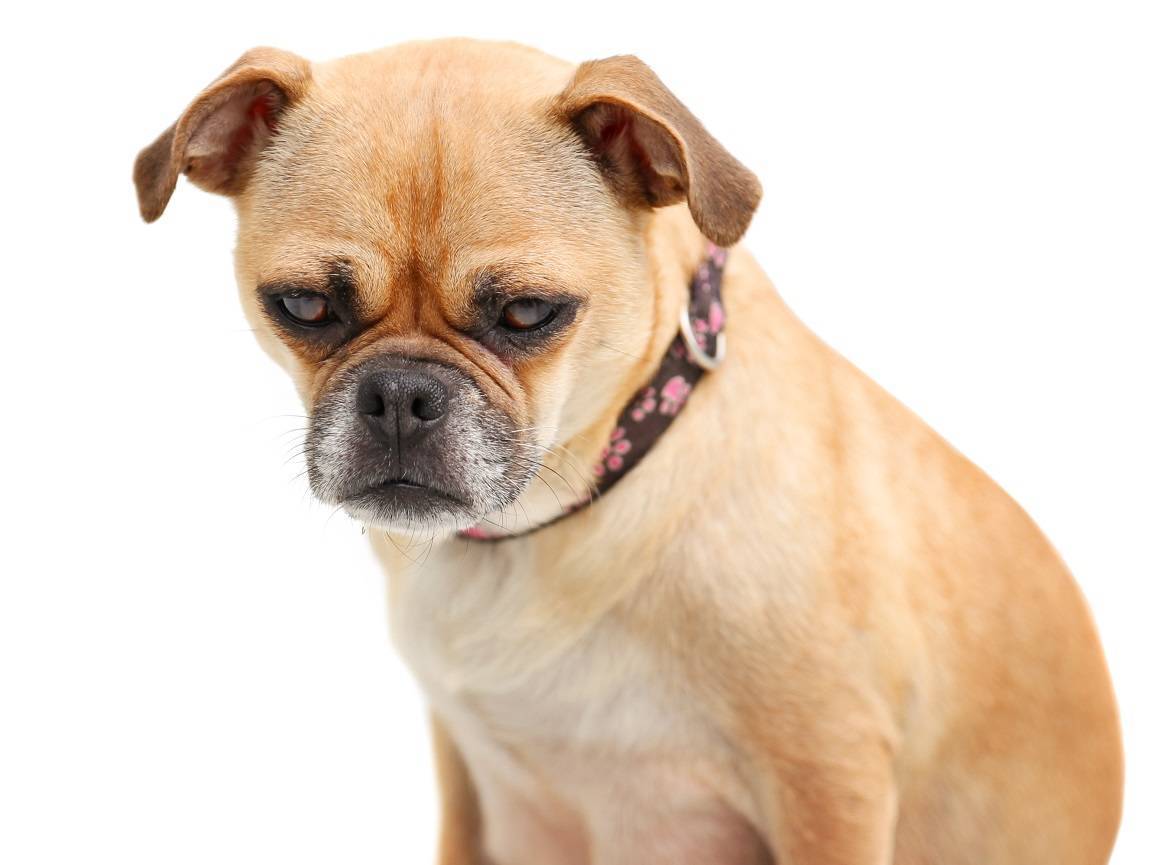
Paws ‘N’ Pups Quickview
Size
| Energy Level
| Trainability
| Paws ‘N’ Pups Rank
|
Characteristics
| Physical Characteristics: Height: 6-14” (may vary) Weight: 10-20 lbs. Energy Level: Moderate | Colors: The Chug is found in the following colors:
|
Health & Longevity
Average Life Span: 10-15 years
The Chug is a designer dog that is half Chihuahua and half Pug. This crossbreed is very healthy for the most part, but the Chug may be prone to some health problems that affect both parent breeds.
Like many small dogs, Chugs may experience patellar luxation, or the dislocation of the knee joint. The knee joint slides easily in and out of place, resulting in discomfort, pain, and, in severe cases, lameness. They may also suffer from hip dysplasia, in which the thighbone does not fit properly into the malformed hip joint. This condition is degenerative and can ultimately lead to arthritis or lameness. Dogs with hip dysplasia should not be bred. Although it is hereditary, the condition can also be triggered by rapid weight gain or injury.
Hypoglycemia, or low blood sugar, may affect some Chug Dogs and is common among many small breeds. Symptoms of hypoglycemia include anxiety, heart palpitations, shivering, wobbling, weakness or lack of energy, and a change in appetite, whether your dog is eating more or less. In some cases, seizures or a loss of consciousness may occur. Immediate treatment may include consumption or injection of glucose. In the long term, diet management will be necessary to prevent reoccurring episodes.
Chugs may have respiratory problems like the Pug, and may be prone to eye injuries like both parent breeds. He also may experience dry eye, caused by insufficient tear production, and allergies.
This is a healthy breed overall, and the average lifespan for a Chug Dog is 10-15 years.
Temperament & Train-ability
The temperament of a Chug can vary and will be some combination of Pug and Chihuahua characteristics. However, the typical Chug is lively, friendly, and gentle. He is very loyal and loving towards his family, and he may form a particularly close attachment to one family member.
The Chug Dog should not live outdoors; he is an indoor family dog who enjoys the companionship of his people. He is small with only moderate exercise needs, so he is a good fit for apartment living. Thirty minutes of walking daily is typically sufficient exercise for a Chug, although a particularly high energy dog may need more. Chugs also enjoy playing games, so try to find time to play with your dog when possible. Like the Chihuahua, the Chug Dog can be yappy at times, but he generally does not make a good watchdog and will not always alert his family of danger.
Chugs need early socialization to prevent potential issues with other dogs and children, but they are good with smaller pets such as cats. In general, the Chug can get along well with children and is affectionate and playful, but it is best to supervise him around younger children. One reason is his small size and fragility, but another reason is that he may snap or snarl if a child is too rough or is overwhelming him. Like many small dogs, the Chug seems to be unaware of his size and will likely be aggressive towards larger dogs, so keep him safely on a leash anywhere he is likely to encounter big dogs. Chug behavior towards strangers varies. Some do well with strangers, while others may be a bit shy. Early socialization can help in this area as well.
To successfully train a Chug Dog, it is important to start early. If you wait too long to start, your Chug may be stubborn and resistant. If you start training your dog soon after bringing him home, he will be more responsive, and his intelligence will make it a relatively easy task. Chugs can get bored or distracted easily, so keep sessions short and upbeat. Use positive reinforcement in the form of favorite treats, extra playtime, or praise if earned. There is always the possibility of stubbornness from a Chug, so be clear, consistent, and firm. Consistently enforce your rules and expectations without being overly harsh. With patience and encouragement, the Chug Dog can be highly trainable.
Grooming
The Chug can have a short coat or long hair. Many Chugs shed heavily, while others may be moderate shedders. Depending on how much your Chug sheds, a quick daily brushing may be needed. If your Chug has a shorter coat, weekly or twice weekly brushing may be sufficient.
Bathe as needed. If shedding is particularly heavy, you may want to bathe your Chug once a week. Be sure to carefully and thoroughly dry your dog’s ears after each bath. If your Chug has skin folds and wrinkles, they should be wiped with a damp cloth and then carefully dried at least once a week. Applying baby powder can help these areas remain dry longer.
Trim nails as needed to prevent overgrowth and cracking. Check ears weekly for signs of infection including redness, odor, and tenderness. Also ensure there is not excessive buildup of wax, dirt, or debris. Brush your Chug’s teeth at least three times a week, although brushing daily would be best. Small dogs are likelier to develop periodontal disease, so maintaining good oral health is crucial for a Chug Dog.
Diet
On average, a Chug should eat ¾-1.5 cups of high quality dog food designed for smaller dogs daily. Of course, the exact type and amount of food will vary depending on your individual dog’s age, weight, metabolism, and activity level. Because they are designer dogs, Chugs in particular may vary in size, so there is no “one size fits all” amount of food for this breed.
Some Chugs may have a tendency to overeat and gain weight quickly, so be sure he is not overfed. Weight problems can lead to more serious health issues, particularly joint and respiratory ailments. Divide your Chug’s food into 3-4 small meals daily, both to prevent overeating and to maintain healthy blood sugar levels.
Be sure clean, fresh drinking water is available to your dog at all times.
Looking for a Chug?
 Find A Chug Breeder |  Chug Puppies For Sale |  Adopt A Chug |
Cost
The average cost of a Chug Dog is $450-$750, although prices can vary widely. Factors such as breeder location, pedigree, and gender can impact cost.
If you are looking to adopt a Chug, expect adoption fees to cost up to $175.
Paws ‘N’ Pups Ranking
Paws ‘N’ Pups ranks every breed out of 4 with 1 being easiest to integrate into your life and 4 being the toughest – The lower the ranking the better.
Ranking takes into account a few basic factors including cost, skill level needed, high vs low maintenance and how critical regular training is to success. The Chug Dog ranks a 3. They are a mostly healthy breed with only moderate exercise needs, and they can easily adjust to apartment living if needed. However, early socialization is key to prevent problems with children and other dogs, and some Chugs are very heavy shedders who need a fair amount of maintenance. They also may be stubborn and bore easily during training, and some can be quite yappy.
Breeds Similar To Chug
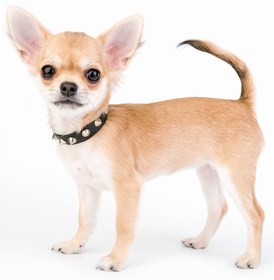 Chihuahua | 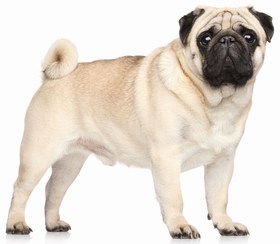 Pug | 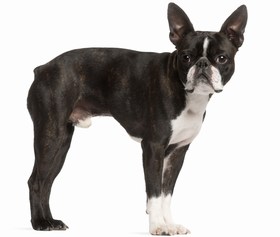 Boston Terrier | 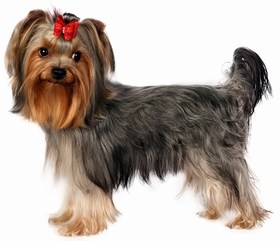 Yorkshire Terrier |


